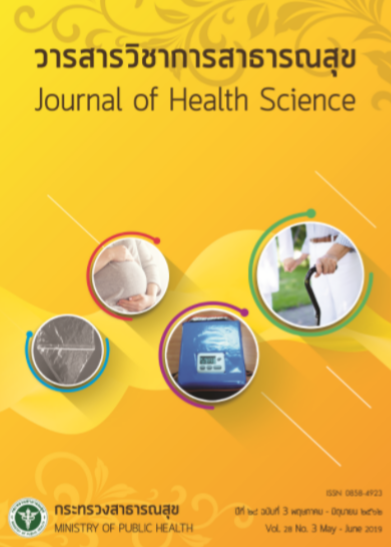Development of a Diabetes Mellitus Care Model at Somdet Phra Phutthaloetla Hospital
Keywords:
patient care model, diabetes mellitus, self care behaviorAbstract
The objective of this study were to develop a medical care model for diabetic mellitus patients, and to evaluate the effectiveness of and the satisfaction on the model. It was designed as a before-after, two group pretest-posttest experiment during August - December 2018. The samples were 80 uncomplicated diabetic patients who were unable to control their blood sugar level, and agreed to cooperate in research. They were divided into 2 groups of 40 cases: the study group who were managed by the model, and the control group manage by routing care. The components of the developed care model included examination and treatment by a doctor, provision of knowledge and advice on self-care practices, evaluation of self-care behaviors, provision of medicine, and following up by phone after each treatment in the first 2 months. In the third month, patients who were still unable to control blood sugar would be sent to the doctor for appropriate drug adjustment, home visits to find the cause, and encouragement of care by their relatives. For the control group, the services included treatment, advice on the condition of the patient, provision of medicine, and appointments for follow-up investigation. The research tools were diabetic care model, pre- and post-test, satisfaction questionnaire, and blood sugar level record. Data were analyzed by descriptive statistic, Chi-square test, independent t-test and paired sample t-test. It was found that the study group had higher average diabetes mellitus knowledge scores and self-care behavior compared to those before the study; and the blood sugar level was significantly decreased (p<0.001). The study group had higher average diabetes mellitus knowledge scores and better self care behavior than control; and blood sugar level had higher decline than those of the control (p<0.001). Moreover, 97.5% of care providers had high level of satisfaction on the model. Thus, the diabetic mellitus care model was found to be effective and gain high satisfaction. The model should be widely applied for the care of diabetes patients in all levels of health facilities.
Downloads
Downloads
Published
How to Cite
Issue
Section
License
Copyright (c) 2019 Journal of Health Science - วารสารวิชาการสาธารณสุข

This work is licensed under a Creative Commons Attribution-NonCommercial-NoDerivatives 4.0 International License.







